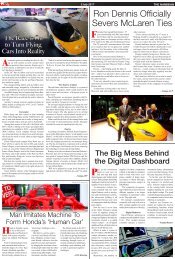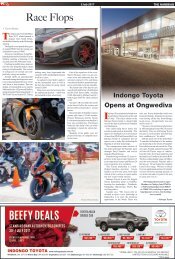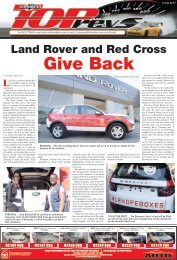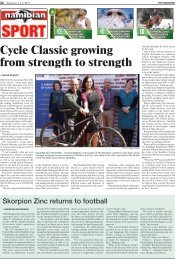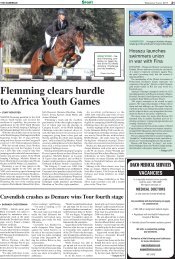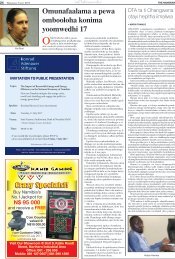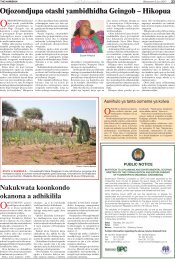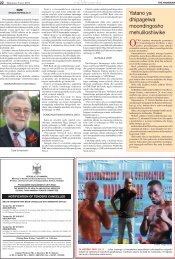You also want an ePaper? Increase the reach of your titles
YUMPU automatically turns print PDFs into web optimized ePapers that Google loves.
6 Wednesday 5 July 2017 National News<br />
THE NAMIBIAN THE NAMIBIAN<br />
National News<br />
Wednesday 5 July 2017<br />
7<br />
We want to turn<br />
this project into<br />
a big and viable<br />
venture which<br />
will help<br />
orphans and<br />
people living<br />
with disabilities.<br />
– Nason Vihinda<br />
BAKING ... Project manager of ‘Disability on the<br />
Move’, Nason Vihinda, puts the cookies in the oven.<br />
Group sees baking as<br />
ticket out of poverty<br />
• PETRUS MURONGA<br />
THE aroma of freshly baked<br />
cookies hangs in the air as I approach<br />
the kitchen of the ‘Disability<br />
on the Move’ project in<br />
Tutungeni, Rundu in the Kavango<br />
East region.<br />
Nason Vihinda meets me at the<br />
door of the house’s garage, which<br />
has been turned into a kitchen.<br />
Vihinda, the project manager,<br />
is one of seven people with disabilities<br />
who bake cookies here<br />
every day for sale to earn a living<br />
in a region where unemployment<br />
is at 39%, according to the 2016<br />
Labour Force Survey of the Namibia<br />
Statistics Agency (NSA).<br />
The ginger and oats cookies<br />
taste as good as the aroma enveloping<br />
this kitchen. Some are<br />
crispy, others are soft and chewy,<br />
and leave a memorable sweetness<br />
in the mouth. The quality is as<br />
good as any.<br />
Any other group would have<br />
been fine churning out these cookies<br />
every day, but for Vihinda and<br />
his colleagues, it is a challenge to<br />
work in a makeshift kitchen not<br />
designed to accommodate bakers<br />
with physical disabilities. All of<br />
them need to use either crutches<br />
or wheelchairs for mobility, and<br />
in the absence of both, they crawl<br />
on their knees.<br />
The group used to have 14<br />
members, but some left after they<br />
realised there is not much money<br />
to be made, said Vihinda, who<br />
uses crutches. Vihinda contracted<br />
polio at a young age, and this left<br />
him with a permanent physical<br />
disability.<br />
Other members left because<br />
they were unable to perform their<br />
duties due to their physical conditions.<br />
The project began about 10<br />
years ago with the help of Dutch<br />
volunteer Saskia Dieks.<br />
Showing this reporter around<br />
the packed bakery as other members<br />
were busy with their chores,<br />
Vihinda said they used to sell<br />
cookies at different government<br />
offices and in the central business<br />
district. But this became difficult<br />
due to a lack of transport after<br />
Dieks returned to The Netherlands<br />
in 2011.<br />
Dieks used her car to transport<br />
the cookies. Now, the members<br />
carry the cookies in backpacks<br />
from one place to another, a difficult<br />
task since most of them use<br />
wheelchairs or crutches.<br />
The project’s turnover is not<br />
much either. Members are given<br />
N$300 per month, which is<br />
mostly used for transport to<br />
and from the bakery. The rest is<br />
ploughed back, and used mainly<br />
to buy ingredients and pay for<br />
other expenses.<br />
Their wish is to expand the<br />
project and acquire a bigger<br />
oven, in which they can bake<br />
wedding cakes, bread and other<br />
confectionery.<br />
“We want to turn this project<br />
into a big and viable venture<br />
which will help orphans and<br />
people living with disabilities,”<br />
said Vihinda while putting a tray<br />
of cookies into an eye-level oven.<br />
The seven would also like to open<br />
a cafeteria.<br />
Their main challenges are<br />
lack of transport, limited work<br />
space, and insufficient baking<br />
equipment.<br />
The kitchen is too small to accommodate<br />
the wheelchair used<br />
by group member Johanna Leevi.<br />
As a result, she uses the chair for<br />
DONE ... Renathe<br />
Muronga from the<br />
‘Disability on the<br />
Move’ project<br />
places freshly<br />
baked cookies<br />
on a plate to cool<br />
before packaging<br />
them in plastic<br />
bags.<br />
RESTING ... Members of ‘Disability<br />
on the Move’ sit in a garage which<br />
they have turned into a kitchen.<br />
From left are David Ndjamba,<br />
project manager Nason Vihinda,<br />
Johanna Leevi and Christophine<br />
Muronga.<br />
sitting most of the time, but walks on<br />
her knees from counter to counter to<br />
perform her duties.<br />
Vihinda accused Namibians of not<br />
being willing to help out because<br />
since the project started, only foreigners<br />
had offered them assistance.<br />
However, he commended former<br />
Kavango East education director<br />
Alfons Dikuwa, who granted them<br />
permission to work from the garage<br />
where they operate from.<br />
The group also received a donation<br />
of about N$37 352 (2 500 euros) from<br />
Cor de Vos, former mayor of Nieuwegein,<br />
a city in The Netherlands,<br />
which they used to buy a fridge and<br />
the small oven they are using.<br />
Another member, Renathe Muronga,<br />
appealed to the Rundu Town<br />
Council to provide them with a suitable<br />
area in town where their business<br />
could be visible.<br />
“We want the council to at least<br />
give us a [place] in town because<br />
here, there are few customers,” she<br />
8141S Loyalty REP NAM<br />
said, balancing on her crutches while<br />
arranging cookies in a pan.<br />
Muronga, a mother of two, became<br />
disabled from polio at the age of<br />
two. However, her disability never<br />
stopped her from going to school.<br />
Muronga today boasts a certificate<br />
in hospitality from the Community<br />
Skills Development Foundation<br />
(Cosdef).<br />
Other members, David Ndjamba<br />
and Christophine Muronga, also do<br />
not want the project to fold.<br />
“We want support, like that which<br />
other projects are getting,” said<br />
Ndjamba, who contracted polio at<br />
the age of four.<br />
Muronga called on regional and<br />
national leaders to assist them, saying<br />
being disabled and a mother is<br />
not easy.<br />
“Our leaders should look at us, and<br />
help our project grow. People living<br />
with disabilities are doing well in<br />
other countries because their leaders<br />
assist them in different ways,”<br />
she noted.<br />
The mother of three became disabled<br />
in 2012 after a stroke. She said<br />
the project had given her the zeal to<br />
not give up on life but live as normally<br />
as possible.<br />
Leevi, with her trousers white at the<br />
knees from the flour which she walked<br />
on on the floor, wished things could<br />
change for the better for the group<br />
so that they could at least take their<br />
project to greater heights. She too has<br />
a certificate from Cosdef.<br />
Apart from government offices,<br />
the group sells cookies to various<br />
supermarkets in town.<br />
Assistant manager of OK Foods<br />
supermarket Neila Felisberto said<br />
they help the group by buying their<br />
products and providing them with<br />
flour as part of their social responsibility.<br />
“We are with them in the struggle,<br />
and they must continue with the<br />
project,” advised Felisberto.<br />
The governor of Kavango East,<br />
Samuel Mbambo, said he was aware<br />
of the group’s efforts, and commended<br />
them for the example they<br />
had set for other people living with<br />
disabilities as well as able-bodied<br />
ones.<br />
He thus urged them to persevere,<br />
promising that his office will see how<br />
it could help them achieve their goals.<br />
“We are very proud of them. Disability<br />
does not mean inability. They<br />
should keep on and be a shining example<br />
to the community,” Mbambo<br />
stated.<br />
Members of the ‘Disability on<br />
the Move’ group have refused to be<br />
cowed into submission and vowed to<br />
soldier on. – Nampa<br />
JOIN THE<br />
SPUR FAMILY<br />
TODAY!<br />
Traditional healers tell<br />
‘botsotso healers’ to go<br />
• ADAM HARTMAN<br />
at WALVIS BAY<br />
INSTEAD of a kudu horn headset,<br />
hyena cloak, cheetah briefs,<br />
black mamba belts or crocodile<br />
vellies, Erongo traditional healers’<br />
committee chairman Immanuel<br />
Katambu was casually dressed.<br />
The Namibian met him yesterday<br />
in his small but neat and cosy<br />
living room at Kuisebmond, where<br />
a large plasma-screen television<br />
and an impressive sound system<br />
dominate the space.<br />
The meeting was to discuss the<br />
problem of fake traditional healers<br />
from foreign countries, who are like<br />
“lions”, stealing from Namibians<br />
and giving authentic local traditional<br />
healers a bad name.<br />
“I am not a witch doctor; that is<br />
derogatory, and sangoma is South<br />
African, not Namibian. I am a<br />
registered and certified traditional<br />
healer. That is how I make my<br />
living.<br />
“My ancestral spirits use me to<br />
help others,” explained Katambu.<br />
Besides a budgie chirping from<br />
a closed box, wanting to get out,<br />
nothing else seemed unusual.<br />
Last week, the Erongo police<br />
took a Malawian man in for<br />
questioning for allegedly swindling<br />
a Walvis Bay woman out of<br />
N$10 000.<br />
She got his name from a newspaper<br />
classifieds page. There<br />
were dozens of advertisements of<br />
different traditional healers who<br />
were claiming to cure anything<br />
and everything, including breaking<br />
curses, healing HIV-AIDS,<br />
giving instant riches, promising<br />
health, wealth and prosperity, better<br />
sexuality, better employers, and so<br />
the list goes on.<br />
Initially, the woman wanted<br />
to consult the healer over chest<br />
pains, but she apparently forgot<br />
about the pain when he offered her<br />
instant wealth. After performing a<br />
few tricks, he convinced her of his<br />
‘magic’ and lured her to Independence<br />
Beach, where she brought him<br />
R10 000 cash at his request.<br />
He wrapped the money neatly<br />
in a plastic bag and added sand,<br />
saying the sand will change into<br />
money when the bag is thrown into<br />
the sea. He threw the bag into the<br />
YOUR<br />
BENEFITS<br />
Earn 5% of the value of your bill<br />
(excluding VAT and waitron tip)<br />
back in vouchers.<br />
Receive a N$50 Spur voucher loaded onto<br />
your card once you have spent N$1000<br />
(excluding VAT and waitron tip).<br />
Ask your waitron for your<br />
Spur Loyalty Card today!<br />
Visit www.spurinternational.com/namibia for Terms and Conditions<br />
or for any queries, contact Spur Customer Care on +27 21 525 6670<br />
Immanuel Katambu<br />
water, and she was told to return<br />
the next day.<br />
“Meantime, he contacted his accomplice,<br />
also a traditional healer,<br />
who retrieved the bag that was held<br />
down under the water by the weight<br />
of the sand, and fled to Malawi with<br />
the money,” said Erongo police<br />
head of community affairs, warrant<br />
officer Ileni Shapumba.<br />
“It cuts both ways. It is not only<br />
the traditional healers who are at<br />
fault. Their customers are also to<br />
blame because their motives are<br />
not honest most of the time. That<br />
is why they consult the healers at<br />
night. Only when they lose something<br />
will they report it”, he added.<br />
Shapumba also urged the media<br />
not to support healers by allowing<br />
them advertising space as it was<br />
promoting corruption.<br />
“What they (fake healers) do is<br />
criminal. They steal under false<br />
pretences,” he said, warning people<br />
to stay away from traditional<br />
healers, especially those who are<br />
not registered.<br />
Katambu said the media should<br />
ensure that the traditional healers’<br />
advertisements contain their real<br />
names, mobile numbers and landline<br />
numbers, as well as address and<br />
registration number to ensure that<br />
they are authentic. He said a single<br />
healer places different advertisements<br />
under different names and<br />
different numbers, just to throw the<br />
net wider to lure more customers.<br />
Katambu is from Otjimbingwe,<br />
where he finished Grade 8. Because<br />
he lived with his religious grandmother,<br />
he soon found himself as<br />
a pastor of the church.<br />
“I always wanted to be a psychologist,<br />
but the spirit started<br />
coming to me. I realised that it was<br />
the spirit of my grandfather which<br />
wanted to manifest itself in me as<br />
a traditional healer. Being a pastor<br />
and traditional healer does not go<br />
hand-in-hand, so I quit the pulpit<br />
due to pressure from the spirit, and<br />
became a healer,” he explained.<br />
He has been a healer for the past<br />
five years.<br />
He claimed that he had managed<br />
to have thieves arrested on<br />
behalf of a client a few years ago.<br />
Thereafter, the police called for<br />
the establishment of a traditional<br />
healers’ committee, and he was<br />
appointed its chairman.<br />
The committee is very clear<br />
about its services and areas of<br />
work, and they pay a membership<br />
fee. There are about 10 healers at<br />
Walvis Bay, and about 30 in the<br />
wider Erongo region.<br />
Katambu said many bogus healers<br />
come from countries such as<br />
Malawi, Zimbabwe and Tanzania<br />
to steal from desperate Namibians,<br />
and then flee back to their countries.<br />
He said a few years ago, fake foreign<br />
traditional healers had flocked<br />
to Windhoek, but when Windhoek<br />
“woke up”, the healers fled to the<br />
coast. The influx to Walvis Bay<br />
started in 2014.<br />
“They must face the law. They<br />
are ‘botsotso healers’ who must go<br />
back to where they came from, and<br />
leave our people alone,” Katambu<br />
fumed.<br />
He also urged government to pass<br />
the Traditional Health Practitioners<br />
Bill which was tabled by former<br />
health minister Richard Kamwi<br />
in 2014.<br />
“Having such a bill will give<br />
government the teeth to regulate<br />
this profession and ensure that<br />
Namibians are protected against<br />
fake healers.”<br />
Asked if he ever wore the apparel<br />
associated with traditional healers<br />
and performed strange rituals, he<br />
laughed and said it depended on the<br />
spirit at the time. He, however, did<br />
not answer “no”.<br />
Join the<br />
family!<br />
IT’S FREE!



